English online version of the business chronicle
( 1870 – 1995 )
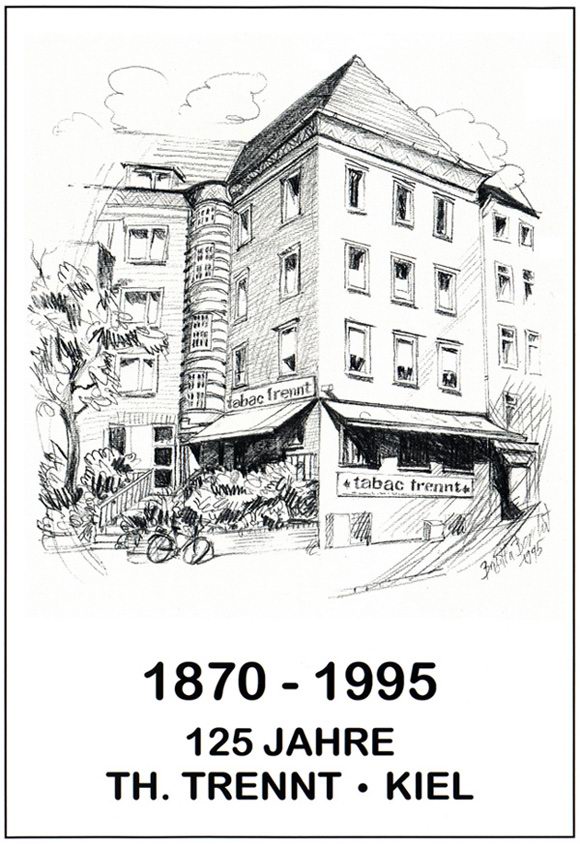
Published on the occasion of the 125th anniversary
of the company Th. Trennt in Kiel on 17 June 1995
Pencil drawing: Brigitta Borchert
Portrait drawings: Ernst-Ludwig Hanss
Photos: Th. Trennt, Photographer Renard, City Archive Kiel
Text, Layout and Printing: Th. Trennt
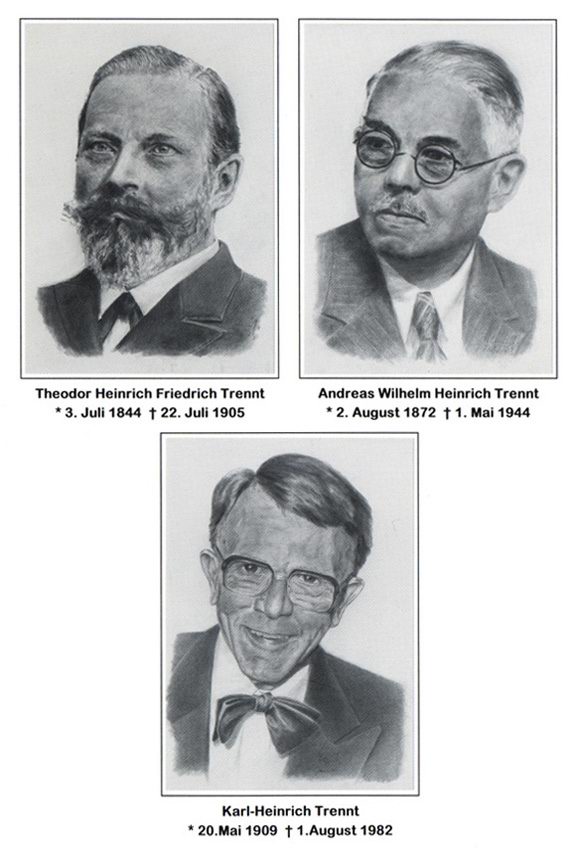
The firm of Th. Trennt has been a family business for 125 years – from the foundation of the German Reich up to the reunification of Germany. Such drastic events as the two world wars and the Great Depression with millions of unemployed lie in between.
The ancestors of the Trennt family have been listed since 1711 in the citizens‘ records of the City of Kiel. In 1854 first mention is made of a cigar maker, namely Johann Paul Heinrich Trennt, who founded a cigar factory and a cigar shop on Schumacherstrasse no. 25 and no. 35 in Kiel on 1 July 1866. Until his death in 1906, the company was registered in the register of companies. His youngest brother, Theodor Heinrich Trennt, born on 3 July 1844 in Kiel, also learned this trade from him. Prompted by rising cigar sales, he soon ventured into self-employment and on 17 June 1870 he opened his own cigar shop including manufacture on Brunswiker Strasse No. 3. In doing so, he showed great courage and foresight, especially since it was the first shop on this street.
A photograph from the year 1897 (illustration pg. 1), which hangs in the entrance of the present-day shop and catches the glances of passers-by, shows the founder of the firm in front of the entrance of the first shop on Brunswiker Strasse No. 3.
The Society for the History of the City of Kiel describes Brunswik in its reports as being a rising and rapidly growing suburb. Building was begun in 1863 on the adjoining hills of the „Academic Sanatorium“, today’s university clinic. The main building of the university, completed after three years of construction, was officially opened by the vice-chancellor Dr. Bernhard Weiß, Professor of Theology on 25 October 1876. The architects of this imposing building which lay exactly across from the firm of Th. Trennt were Professor Gropius and Architect Schmieden. A built-up university quarter emerged there at the beginning of the 20th century. In 1895, Dr. Johann-Hermann Lubinus founded his „Institution for Physiotherapy and Orthopaedics with Massage“ in the immediate vicinity.
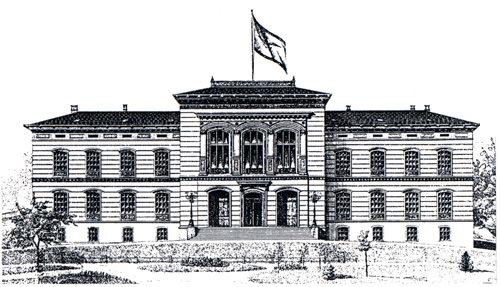
In 1871 Kiel’s status was raised to that of an imperial harbour and this completely changed the city’s economic framework: the navy placed high demands on the shipyards and industry, on trade and commerce. This was the beginning of Kiel’s ascent towards being a major city.
During the following years the Brunswiker Strasse became a well-known connection between the newly developed residential areas in the north of Kiel and the city, the university, as well as the two naval bridges, both situated in the area of today’s „Oslo Quay“. Launches lay here awaiting the employees of the navy and the shipyards in order to take them to the ships and offices on the eastern side of the inlet.
„Civil servants, teachers, professors, merchants and tradespeople are settling down, partly around the ‚Klein Kiel‘ (an inland harbour in the city) and partly in the suburb of Brunswik,“ can be read in a contemporary description. These were promising prerequisites for trade and, thus, the development of the firm of Th. Trennt, registered in the register of companies in 1887, was very positive. Apart from cigars, cigarettes from the Middle East were imported directly from Cairo. However, the shipments seldom met the given order.
Unlike today’s fixed-price system, sales prices were individually calculated at that time. This is what made trade with imported goods so lucrative.
As time passed, Th. Trennt developed an extensive mail order business in German colonies and diplomatic missions abroad in addition to store sales: the Imperial Navy, whose war ships sailed from Kiel to all continents, ordered tobacco for the messrooms. Cigars from the firm of Th. Trennt were offered whenever honours were done on board for the consuls and employees of the German diplomatic missions. They carried with them the memory of the excellent quality and arranged to have their orders fulfilled in future by Trennt. Due to the lengthy period of transport the cigars, which were usually packed in cedarwood cases, had to be protected from drying out. For this reason the cases were wrapped in parchment and silver leaf and then sewn into sacking.
Upon introduction of the tobacco tax in 1906, Th. Trennt was forced to maintain a bonded warehouse.
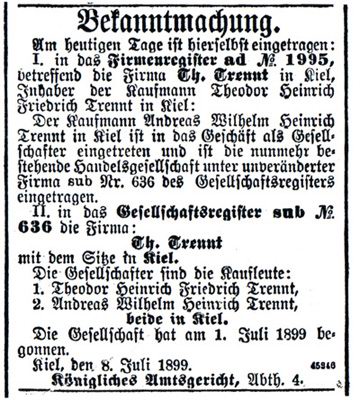
Notice The following has been entered today: I. in the register of companies under no. 1995 concerning the firm of Th. Trennt in Kiel, owned by the merchant Theodor Heinrich Friedrich Trennt in Kiel: The merchant Andreas Wilhelm Heinrich Trennt in Kiel has entered the firm as partner, and the now existing registered company is registered in the register of partnerships under the same name under the no. 636. II. in the register of partnerships under no. 636 the firm of: Th. Trennt with its headquarters in Kiel. The partners are the merchants: 1. Theodor Heinrich Friedrich Trennt, 2. Andreas Wilhelm Heinrich Trennt, both in Kiel. The company began on 1 July 1899. Kiel, 8 July 1899. Royal District Court, Dept. 4.
In 1899, the son Andreas Trennt became a partner at the age of 27. About this time, Trennt’s own cigar factory closed down. Unfortunately, no details are available about this. Until about 1918, four employees were working alongside the owners; in addition, there was an errand boy who took goods to valued customers. At that time, an officer was not allowed to carry even the smallest package; one hand held the sabre and the other hand had to be free to salute.
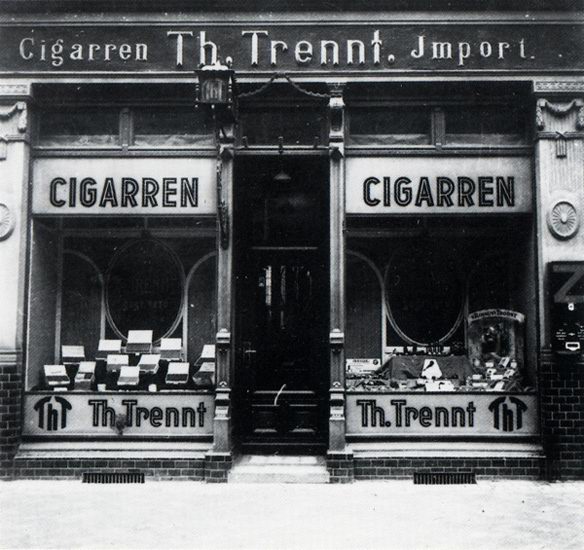
In 1903 it became possible to purchase the neighbouring house no. 5 and open up a modern, new store as well as furnish an apartment for the family. The sales rooms were exemplary. The company name and the addition ‚Cigar Imports‘ shone in brass letters above the two high shop windows. Stylized columns made of wood framed the shop window frontage. In the sales room with its four meter high ceiling the counter was adorned by a showcase for imported cigarettes and a manual Anker cash register. Two constantly burning gas flames offered the cigar smoker a light. The goods were displayed on shelves and in showcases. Four steps led to the office which was screened off from the salesroom by a leaded glass door. Among other things, it contained two long high desks as well as special cupboards for storing cigars and cigarettes. The elegant private office in the rear area was reserved for the company owners.
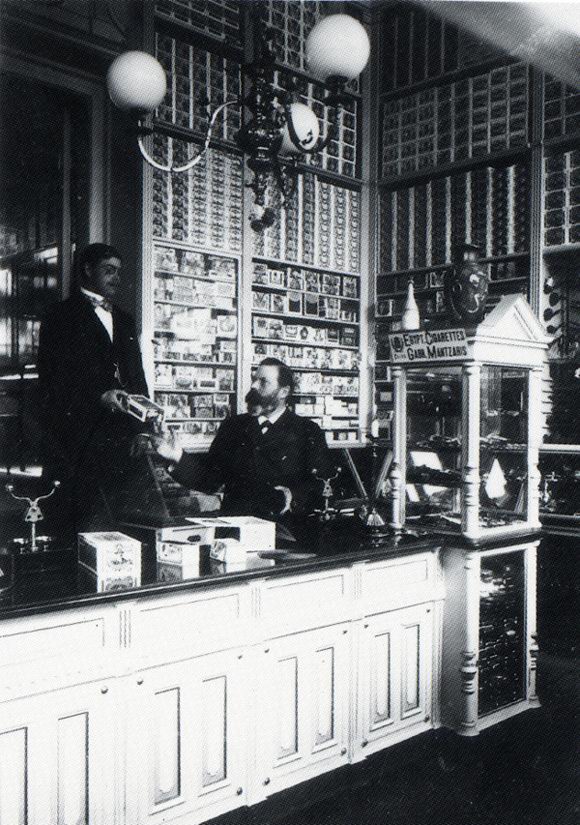
At a later period, a typewriter with a double keyboard was purchased in order to handle the entire correspondence more quickly.
Admiral Count Spee once paid with a particularly valuable gold coin which was kept for years as a talisman and held in high esteem. Unfortunately, it was lost during the second world war in the ruins of the bombed shop.
The founder of the firm died on 22 July 1905 and his son, Andreas Trennt, became the sole owner. The entry in the register of companies was thus: Th. Trennt, Cigar Imports and Exports, Tobacco Shop and Articles for Smokers.
Up until the first world war, more shops were opened on Brunswiker Strasse and Schlossgarten, which led towards the city. These included the book shops of Cordes, Mühlau and Lipsius & Tischer, the tailor’s shop of Lafrenz & Kroll specialising in uniforms, the clothing shops of Witte, Roprecht and Jansen, and the photographers Renard and Ferdinand Urbahns, all of which still exist today. The chemist Rudolf Walter delivered chemicals to the clinics and photographers. Entertainment and a sense of well-being were offered by the following establishments: ‚Hoffnung‘ which included a café and thé dansant, Petzold’s ‚Likörstuben‘ and the exclusive ‚Tusculum‘.
In August 1914, Andreas Trennt received his call-up papers to the territorial reserve. During this time his father-in-law, Heinrich Frinken, an dignified old gentleman with a full beard, stood in for him.
All goods became scarce and people even had to stand in line to buy cigars and tobacco. The later owner, Karl-Heinrich Trennt, who was still a child at that time, remembered that he was asked by someone waiting in line if he wouldn’t wait in line for him also. And he also remembered the following, „My teacher, Mr. Lass, was going to smack me ‚behind the ears‘ for a small misdemeanour. In order to try and avoid punishment I let slip out that he would then no longer receive any tobacco.“
After the first world war the Imperial Navy was no longer a driving force for the economy. The population was reduced because the number of garrisons and naval administrations was reduced. This worsened the trade situation.
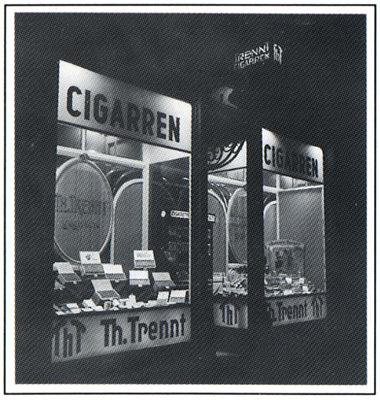
Upon completion of a commercial education, Theodor Trennt, the oldest son of the company owner and, thus, the intended successor, learned the trade of manufacturing cigars at the cigar factory of Paul Hänsel. From 1924 onwards, he worked for his own father. At the end of the twenties, however, because of the precarious economic situation, he had to reorientate himself professionally as the firm’s return was not enough for two families.
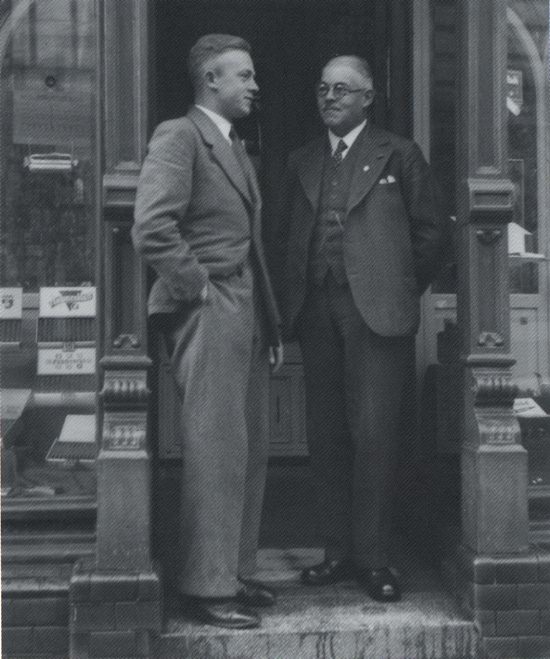
On 1 April 1925, the younger brother, Karl-Heinrich Trennt, began his commercial training at Geisler & Niemann in Kiel after completing his ‚O‘-levels at Dr. Hinrichsen’s private school. One year after completion of his training he moved on to the firm of EDUR Pump Factory. This company was also forced to reduce its personnel and Karl-Heinrich Trennt had to give up his position. In 1932 he began to work in the family business. After only a short while both his business skill as well as his way with customers proved him to be a valuable asset.
The re-establishment of the navy and armament guaranteed a good state of employment and gave new impulses to trade. Old traditions were renewed, and naturally with respect to social life this included a good cigar.
On 1 April 1940 Karl-Heinrich Trennt had to begin his military service. After completing his training in Kiel his call-up papers required that he join the navy at Trondheim in Norway. In 1942 he was sent to the educational inspectorate in Stralsund and later to the infantry in General Wenk’s army to defend the city of Berlin.
During this time his wife, Marianne Trennt, carried on the business, assisted by her father-in-law until his death on 1 May 1944.
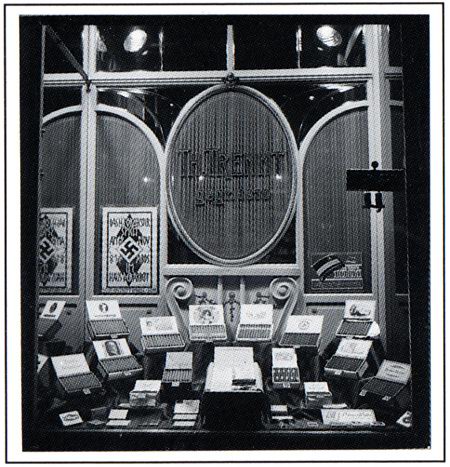
Due to the war it became more and more difficult to obtain cigars, tobacco and cigarettes. Despite this, the demand remained constant and it required a special kind of skill to distribute the goods available fairly. Numerous letters and thank-you notes addressed to Marianne Trennt, which still exist today, prove that she supplied even soldiers and officers at the front with the desired tobacco.
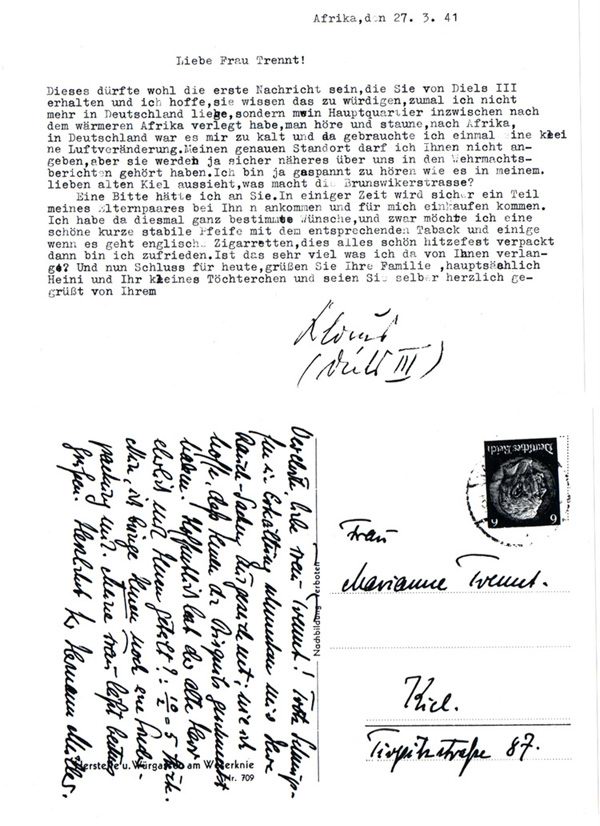
Africa, 27 March 1941 Dear Mrs. Trennt! This must be the first message which you will receive from Diels III and I hope that you appreciate this, especially since I am no longer stationed in Germany and have moved my main quarters to the warmer Africa - would you believe it! - to Africa. It was too cold for me in Germany and I needed a change of air. I am not permitted to tell you my exact location, but you will have heard more about us in the reports about the armed forces. I'm very interested in finding out what's been happening in my beloved city of Kiel: what's going on on Brunswiker Strasse? I would like to ask a favour of you. Sometime in the future one of my parents will come to you to shop for me. I have very special wishes this time: I would like to have a lovely, short, sturdy pipe with the corresponding tobacco and some cigarettes - English, if possible - and everything is to be well packed against the heat. This would make me very happy. Am I asking too much of you? That's all for today, please say hello to your family for me, especially Heini and your little daughter, and I also send greetings to you personally.
My dear Mrs. Trennt!, Despite having a cold, your tobacco tastes delicious - as I hope you found the biscuits to be that I sent you. I hope the old gentleman divided them fairly between you? 10/2 = 5 pieces. Well, I will bring you a special package. My wife sends her best regards. Warm regards, Yours Hermann Müller
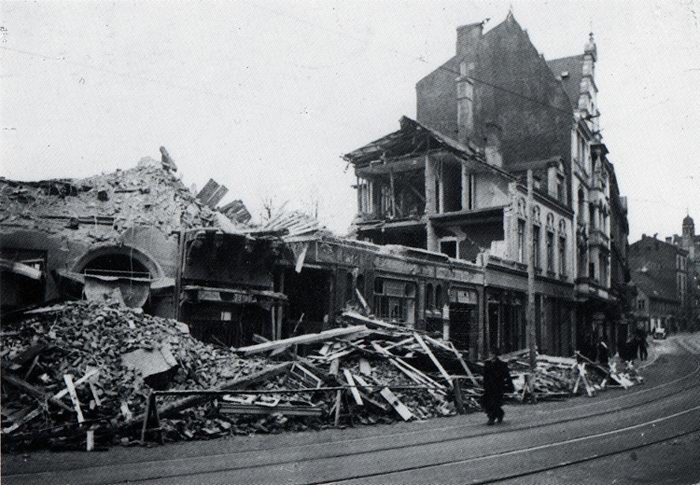
As early as 2 July 1940, the city of Kiel experienced the first full-scale Allied attack due to its exceptional military importance as a war harbour and armament manufacturer of the German Reich. In January 1944, bombs were also dropped on the lower end of Brunswiker Strasse which destroyed the house of Th. Trennt with its shop and living quarters. People risked their lives to try and save whatever was still usable. Only very few souvenirs remained of the lovely shop and all its traditions.
Marianne Trennt kept up the firm in a smaller way in her home on Tirpitzstrasse 87, which today is Feldstrasse. The news quickly spread around Kiel, now mainly destroyed, where cigars, cigarettes and tobacco from Trennt were to be had.
Apart from many cigarette firms such as Reemtsma, Haus Bergmann, Rich. Greiling KG, Kyriazi Frères, Nestor Gianalis and Muratti, the merchandise purchases journals from the years 1941 until 1948 also carry the names of old and well-known cigar factories: Gebr. Bastert, Fried. Erhard, Paul Hänsel, Th. Heinecke, Kessing & Thiele, G. Klevenhusen, Paul Lungwitz, Th. Schmidt, Niemann & Tintelnot, Rinn & Cloos AG, Schwering & Hasse and Villiger Söhne.
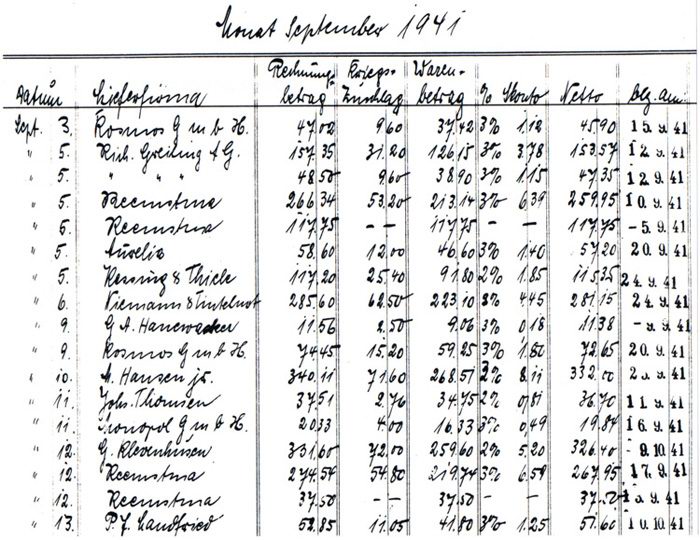
After a short period as a Russian prisoner-of-war, Karl-Heinrich Trennt was released from camp on 25 July 1945. Although he was completely exhausted, his only thought was to rebuild the company. He preferred to see his wife at home with the children and in the kitchen. The business as well as conversations and discussions with the customers was to be left up to him.
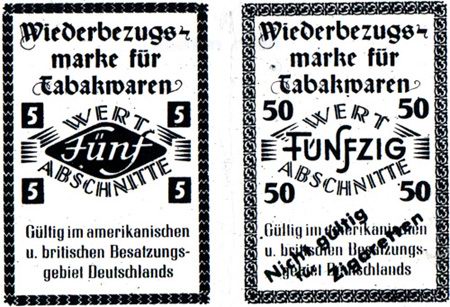
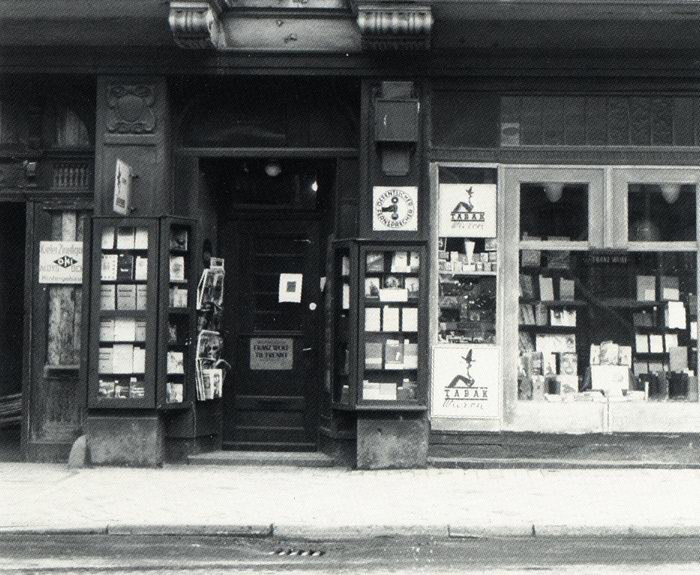
In the neighbouring building which had not been completely destroyed he was given a few square meters and a small shop window from Wolf’s Book Shop to use as a sales space. Slowly the turnover began to increase. He sold cigarettes and cigars from a vendor’s tray at events which took place in Kiel’s ‚Baltic Sea Convention Hall‘.
Karl-Heinrich Trennt did not, by any means, consider himself to be one of the mass of cigarette salesmen and taught his customers the real meaning of his motto: „Smoke, but don’t puff“. If he was at all prepared to sell a package of cigarettes he always passed it over the counter while remarking significantly, „You should enjoy smoking and reach for a natural cigarillo or a pipe.“
After the rubble was cleared, Karl-Heinrich Trennt wanted to rebuild a house for the shop and the family and had the architect, Friedrich Fuchs, draw up definite plans.
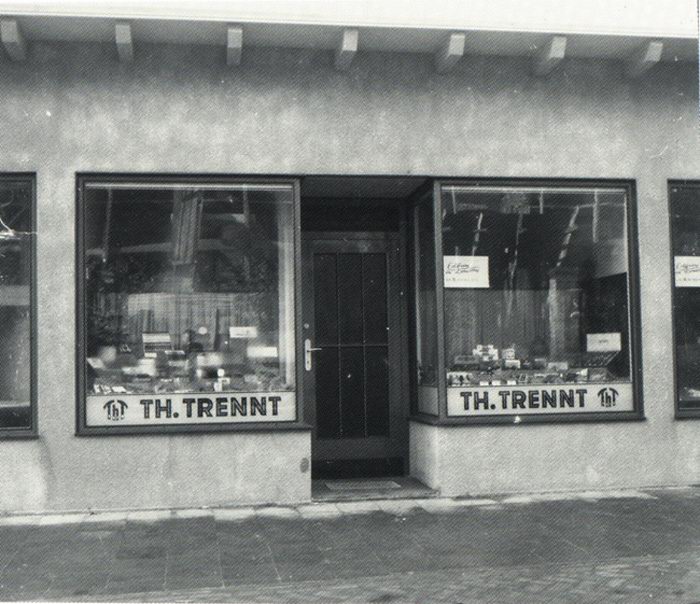
Due to development restrictions the city of Kiel only gave Th. Trennt permission to build a simple, one-storey row of shops on the property. His dream of having his own store was fulfilled on 26 October 1950.
Two also well-established businesses rented the shops next door: Grete Leptien’s „Knusperhäuschen“ and Bertold Dorffmeister’s art shop. He shared his telephone line for the first few years with Dorffmeister by passing the telephone back and forth through a flap door in the wall between the two shops.
In 1953, the „Kieler Nachrichten“ (the local newspaper) held a competition. Readers were requested to write witty rhymes about businesses in Kiel. The verse for Th. Trennt – „Each smoker has his trader – those in the know, only to Trennt do they go“ – won a prize and even today it is a familiar quote, well-known far beyond the city limits of Kiel.
Karl-Heinrich Trennt had his own ideas about which pipe suited which customer and he refused, for example, to sell a very expensive Dunhill pipe to a brand-new smoker who wanted one. „This is the right pipe for you – take this one!“ He often recommended a Masta pipe from England at a price of 13.25 DMarks. Even today, many customers still regard this first pipe highly.
In the middle of the fifties German tobacco factories took over the practice customary in the U.S. of compensating for variations in taste of the different tobacco harvests by adding artificial aromas. This enabled them to use lower-quality types of tobacco as well, because the aromas guaranteed a uniform taste which, however, as Karl-Heinrich Trennt always said, no longer had anything to do with tobacco. This development filled him, the expert and connoisseur of pure tobacco, with blank horror. He began to mix types of tobacco only from different, high-quality tobacco leaves in the classical English method. His father had already done the same when he developed the brand of „Abu Riha“ in 1928. After numerous attempts and constant tests the brand of „TT 91“ was developed in 1961. Excited by the success in sales, Karl-Heinrich Trennt created six further tobacco mixtures during the following years: „Tobac“ in 1962, „TK 93“ in 1963, the oriental mixture „tw 64“ in 1964, the „Anniversary Mixture“ on the occasion of the company’s 100th anniversary in 1970, „Smök mi“ in 1975, and „78er“ in 1978.
Today, the various brands of tobacco, all free from additives, are still produced for Th. Trennt by the tobacco factory of Walter Wehde in Hamburg according to the original formulas. Since the fifties, both firms have enjoyed an intensive, trustworthy and successful co-operation for decades, even after Mr. Wehde sold his company to Kohlhase & Kopp on 1 January 1987 in order to begin his well-earned retirement.
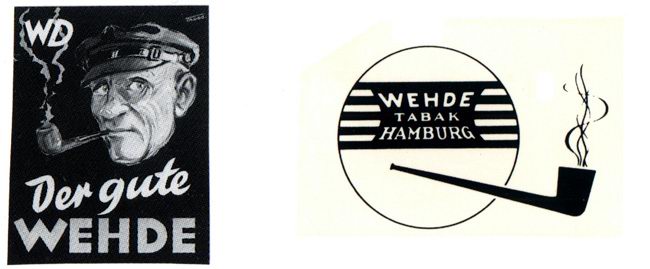
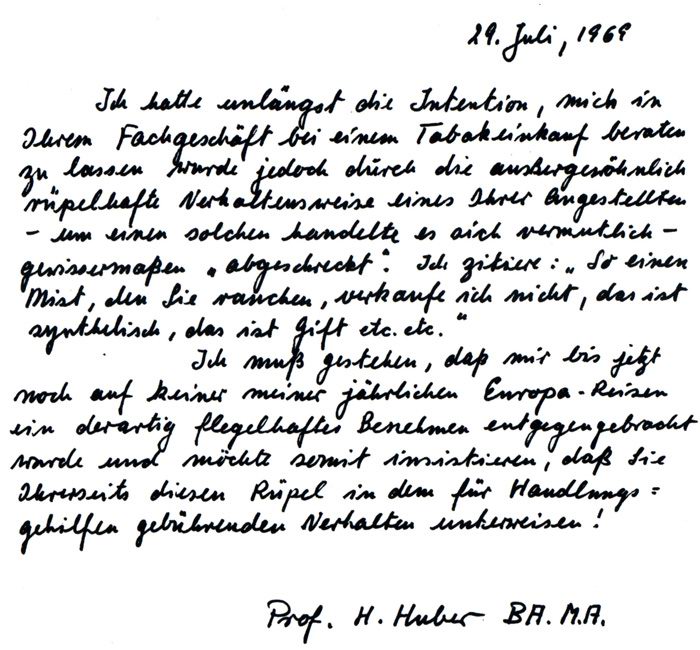
29 July 1969 Not long ago I had the intention of getting some advice in your shop about buying tobacco. I was, however, practically "scared off" by the exceptionally loutish manner of one of your employees - presumably that's what he was. I quote, "I don't sell that crap that you smoke, it's synthetic, it's poison, etc., etc." I must admit that I have never yet experienced such boorish behaviour on any of my yearly trips to Europe and, thus, I must insist that you teach this lout the proper manner in which such employees should act! Prof. H. Huber BA. M.A.
In 1933 a law was passed that machine production in the cigar industry was to cease. Cigarillos and cigars were to be produced manually again in order to create new jobs. This regulation was only repealed in 1955. It freeds the way for the large-scale cigar industry. Machines now made it possible to produce cigarillos in the same manner as cigarettes: with an inner wrapper underneath the outer wrapper made of ground tobacco and binders, similar to the manufacture of particle boards in the timber industry. For years, however, Th. Trennt’s speciality shop kept up close connections with cigar factories which were prepared to continue to manufacture first-class cigars and cigarillos by hand. Paul Lungwitz and his Brazil-Trüllerie and Fried. Erhard must be specially mentioned here. They delivered cigars of the highest quality even before the second world war.
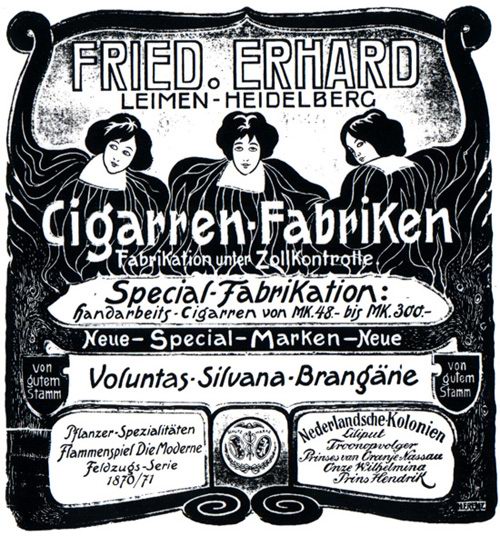
At that time, the representatives of the factories were valued and distinguished personalities. They travelled by train, were picked up from the station in a cab and presented their wares in a type of private audience; cigars could be extensively tested. Hans Erhard, now 91 years old, still produces high-quality cigars today.
The mail-order trade began at the end of the fifties. Students and professors who had to leave Kiel for professional reasons did not want to do without Trennt’s excellent tobacco and had it sent to them by mail. Some of them are still loyal and satisfied customers today. The mail-order business developed completely by word-of-mouth and without any sort of advertising at all. As the turnover increased, the volume of work also grew and so, in 1966, to facilitate accounting Karl-Heinrich Trennt ordered a combined, purely mechanical Anker accounting machine with a cash desk which is still used today as the shop’s till. At a later point, the invoicing for the mail-order clients was simplified by means of an IBM spherical head typewriter which was controlled by punched cards and punched tape.
In 1967, several companies planned to erect a spacious block of flats with a view of the Kiel Inlet on the properties of Brunswiker Strasse 3 to 11. In order to do so, they needed Th. Trennt’s property. After careful consideration, Karl-Heinrich Trennt decided to sell, especially since the business rooms in his wife’s house on Möllingstrasse 28 were free. The lavish reconstruction began after the company’s 100th anniversary in 1970. His son, Jochen-Gunnar, then a student of business administration at the Technical University of Berlin, supported him actively without wasting a thought as to whether he himself would one day carry on the tradition of the company.
On 30 December 1970 Karl-Heinrich Trennt symbolically carried out the move by having himself driven to his new shop in an old, four-horse carriage.
The „Kieler Nachrichten“ noted, „Th. Trennt’s speciality shop for tobacco was located for over 100 years on Brunswiker Strasse. Now the „cigar nobility“ of the state of Schleswig-Holstein and the customers puffing away at their pipes will have to re-orientate themselves to Wilhelmplatz, in the upper ground floor of the building on Möllingstrasse 28. From now on ‚King Trennt‘ will reside there in new and larger rooms, a scent that real men love wafting about him, surrounded by the noblest tobacco provenances in boxes and jars, stored and air-conditioned on elegant shelves made of no less noble types of wood. The selection of cigarettes is also unexpectedly large, although Karl-Heinrich Trennt will no doubt continue to pass a package over the counter with his brief comment, ‚Smoke, but don’t puff!‘ „
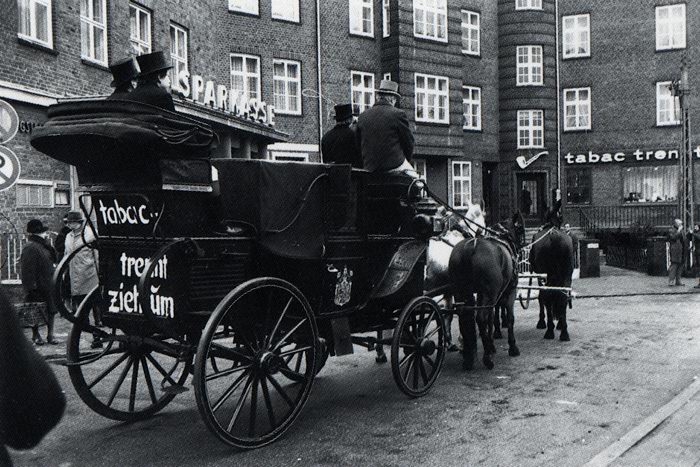
In 1975, Karl-Heinrich Trennt, by now 66 years old, thought about his successor. Every evening he called his son, Jochen-Gunnar, in Berlin, reported on the latest sales figures and tried to make the company attractive to him. In May 1976, after having successfully completed his studies in business administration, the son joined his father’s company.
In the mid-seventies, connoisseurs of good cigars began asking more often again for real ‚Havanas‘. In order to store these sensitive and expensive cigars properly, however, it is absolutely necessary to have a constant ambient temperature of 18 – 20° C and a relative humidity of 70 – 80 %. This is the only way to ensure that aroma and taste are not altered. For this reason it became necessary to install an air-conditioned chamber which was put into operation in 1977.
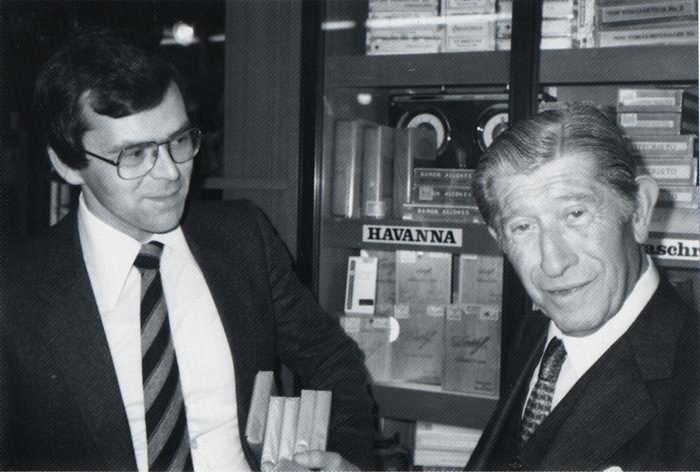
After a Davidoff depot was set up the ‚cigar pope‘ himself, Zino Davidoff, was welcomed in the shop on 7 November 1979. Some of the guests invited for this occasion, among them the bookseller Eckart Cordes, Harald Lindenau, chartered engineer, Count Thun and Dr. Karl Dieter Vitt dined with him at the „Maritim“, a hotel in Kiel. Afterwards, Zino Davidoff authographed his „cigar guide“ in the shop.
From 28 to 30 September 1978, the Cuban cigar maker Federico Hernández demonstrated the fine art of rolling cigars by hand at the invitation of Th. Trennt which aroused a great deal of interest. Cuban cigars are rolled from whole tobacco leaves while those made in Germany contain cropped tobacco.
Karl-Heinrich Trennt died on 1 August 1982. The „Kieler Nachrichten“ dedicated an obituary to him which ended with the words, „So, bye, Karl-Heinrich Trennt! From now on, you’re certain to be floating on a cloud of blue smoke, surrounded by wonderfully scented rings blown by the cigar nobility of Schleswig-Holstein and the tobacco friends on earth.“
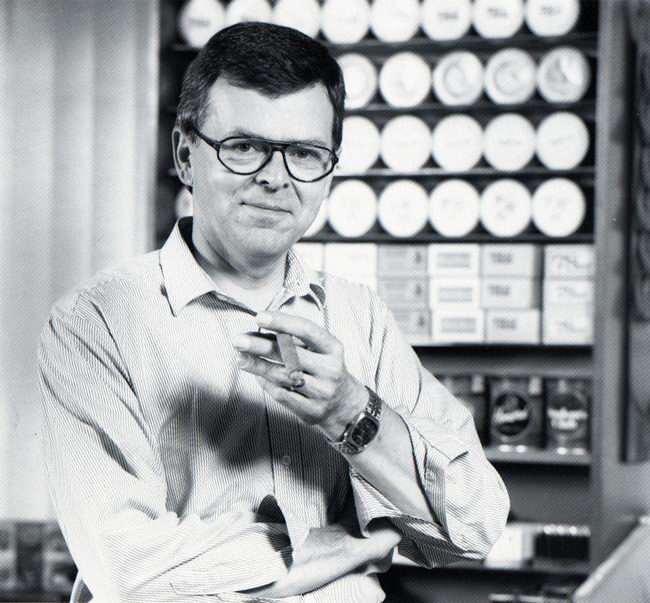
Since then, Jochen-Gunnar Trennt is the sole owner of this firm, rich in tradition, in the fourth generation.
At the age of 16 he smoked his first pipe in his father’s store and later on cigarillos and cigars as well. Today, he is one of the experts of prime tobaccos and can advise his customers expertly, especially since he has tried (almost) all of his cigars and cigarillos. He doesn’t only recommend a tobacco mixture to beginners, but also likes to show them how to properly fill a pipe, light it and smoke. He consistently carries on the tradition of offering only additive-free tobaccos as well as cigarillos and cigars. In doing so, he has often been told that he’s „swimming against the tide“. However, he didn’t only inherit tobacco leaves, but also the persistence to stick to his principles.
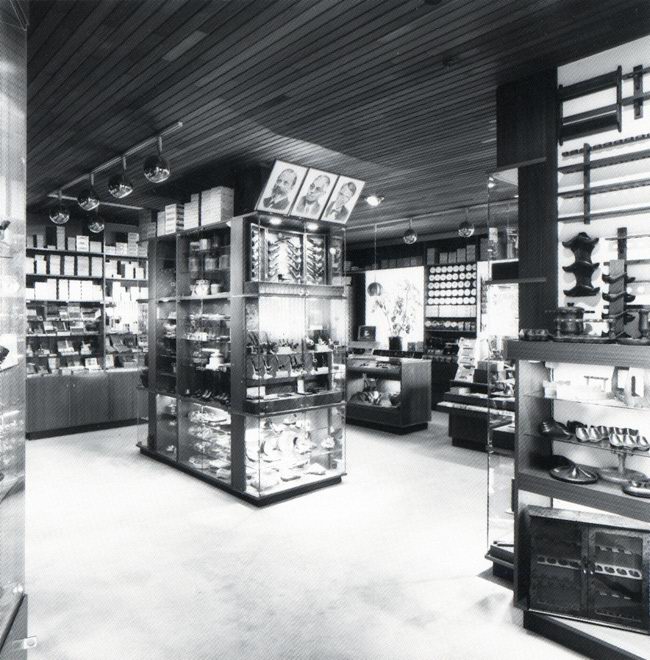
It is important to him to have a pleasant atmosphere for his customers and himself as he does, after all, spend a great deal of his time in the shop.
During the past few years he has finished fitting out the shop and completely redone the offices. Modern data processing equipment was installed to allow clerical operations to be carried out faster and more comfortably. He built a new, larger and better-organized air-conditioned chamber and, apart from the classic ‚Havana‘, he also began to stock cigars from the rest of the Caribbean such as Honduras, Jamaica and the Dominican Republic.
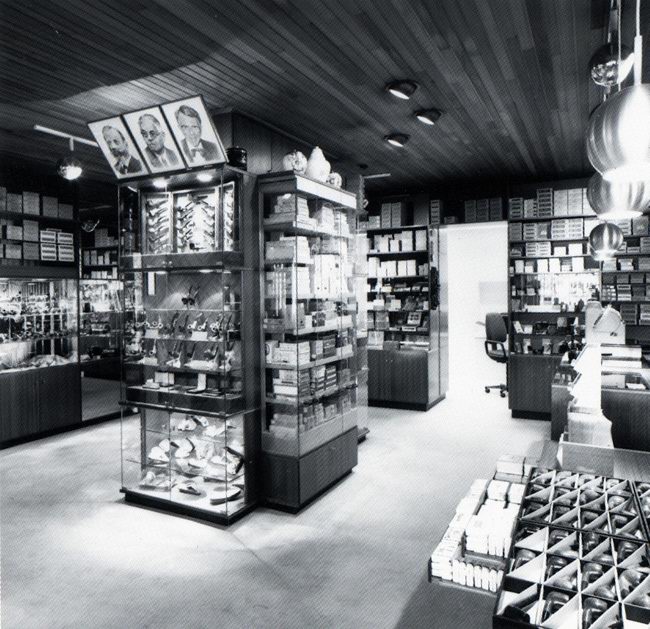
It goes without saying that all cigars and tobacco are stored in a well cared-for manner at Th. Trennt’s, i.e. at a relative humidity of 70 – 80 %. During the summer the shop is also air-conditioned. Connoisseurs of good tobacco, cigars and cigarillos appreciate this.
Unfortunately, an enormous process of integration is taking place in the cigar industry. Many small manufacturers of cigarillos and cigars had to close due to the rising pressure of costs. In order to be able to continue offering his customers first-class goods, Jochen-Gunnar Trennt strengthened his business relationship with the family-run business of August Schuster in Bünde which have been specialists for cigars since 1909.
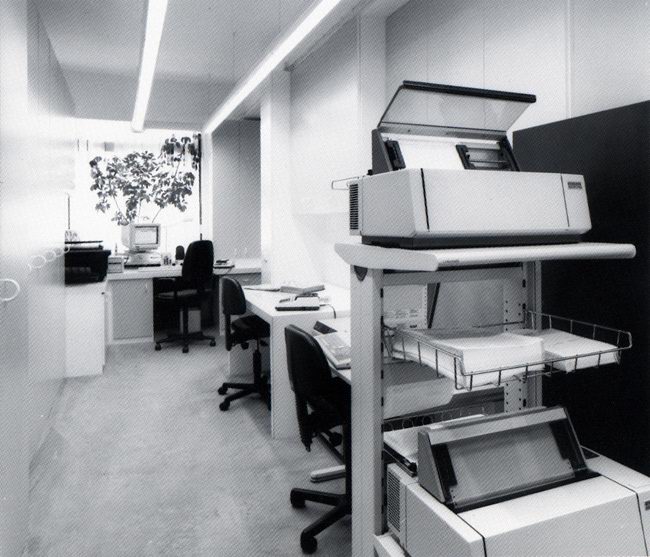
One of the special services offered is repairing pipes; this is done in the company’s own workshop. For years, a reliable employee has been assisting the company owner in this work. Formerly, repairs were carried out laboriously by a tradesman in Hamburg, with correspondingly long delivery periods and frequent cause for complaints. Today, repair orders reach the firm from all over the Federal Republic of Germany and customers often phone to show their appreciation for the excellent quality of the work.
Further employees include a female part-time office assistant who occasionally helps out in the shop. An accountant comes at the end of the month to help with the bookkeeping. A female and two male students help out as required. During the company holidays a former employee regularly ensures that no customer suffers from a „shortage of tobacco“.
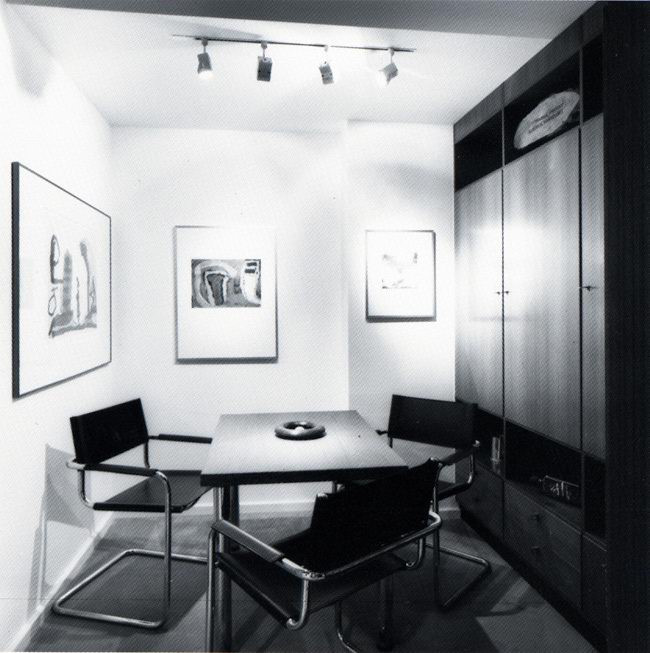
All of the order forms and information for the mail-order trade, labels for the company’s own cigar brands and business papers are printed in the company’s own printing department. The designs are done on a computer and a process camera is available for screening, enlarging, reducing as well as producing the printing plates.
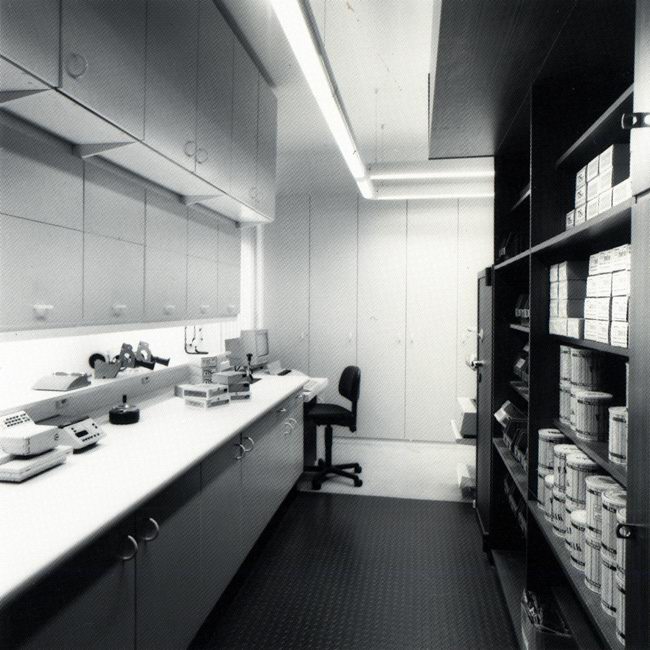
Over two thousand mail-order customers within the Federal Republic of Germany order regularly. Many customers who have been smoking the same tobacco for years simply say on the phone, „Hello, Mr. Trennt, the same again!“
As most of the mail-order customers take part in direct debiting payment of the invoices runs smoothly.
But deliveries are also sent abroad, presently to Brazil, Tokyo and Taipei, Italy, France, Las Palmas and Norway.
Some amusing chance meetings should not remain unmentioned:
Several times, two strangers sat across from each other on the Intercity train; both took their tobacco from Trennt out of their pockets at the same time in order to enjoy a pipe.
In a bar in Tripoli, two customers even became involved in a conversation through the smell of their tobacco. It turned out that they had both smoked „TK 93“ for years.
Only a few weeks ago a customer reported stopping at a petrol station on Chiemsee (a lake near Munich). The petrol station attendant noticed his Kiel licence plate. He said: „That’s where I get my cigars from.“ The customer from Kiel was somewhat surprised that „his“ Trennt delivered even in southern Germany.
Tabac Trennt does not only deliver by mail. Many customers in Kiel are supplied with tobacco, cigars and cigarillos, including noted firms, banks and savings banks.
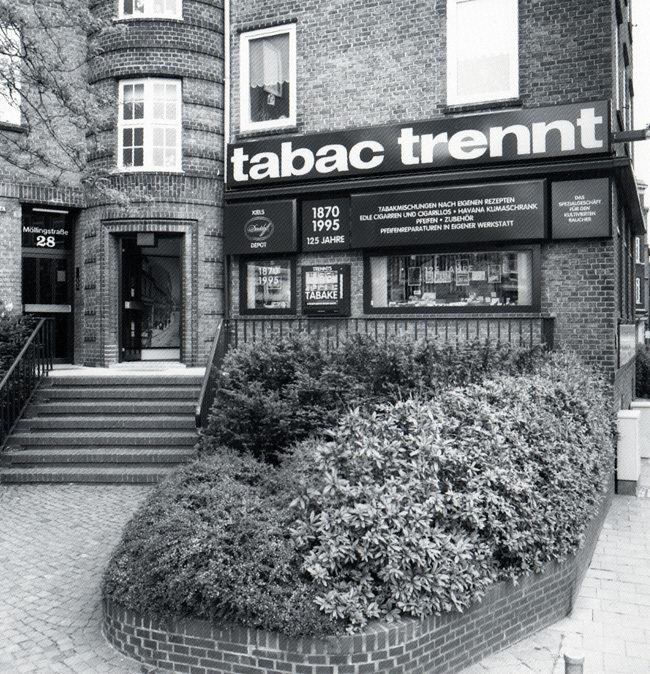
… and just in time for the 125th anniversary the company’s name shines on a new sign above the two shop windows which also received a face-lift.